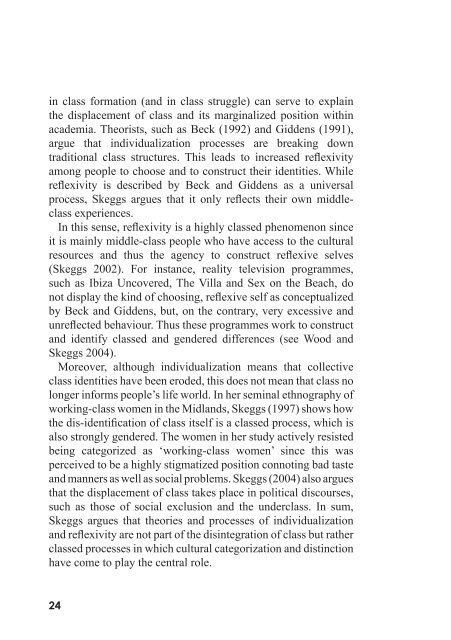Thinking with Bevereley Skeggs - Stockholms universitet
Thinking with Bevereley Skeggs - Stockholms universitet
Thinking with Bevereley Skeggs - Stockholms universitet
- No tags were found...
You also want an ePaper? Increase the reach of your titles
YUMPU automatically turns print PDFs into web optimized ePapers that Google loves.
in class formation (and in class struggle) can serve to explainthe displacement of class and its marginalized position <strong>with</strong>inacademia. Theorists, such as Beck (1992) and Giddens (1991),argue that individualization processes are breaking downtraditional class structures. This leads to increased reflexivityamong people to choose and to construct their identities. Whilereflexivity is described by Beck and Giddens as a universalprocess, <strong>Skeggs</strong> argues that it only reflects their own middleclassexperiences.In this sense, reflexivity is a highly classed phenomenon sinceit is mainly middle-class people who have access to the culturalresources and thus the agency to construct reflexive selves(<strong>Skeggs</strong> 2002). For instance, reality television programmes,such as Ibiza Uncovered, The Villa and Sex on the Beach, donot display the kind of choosing, reflexive self as conceptualizedby Beck and Giddens, but, on the contrary, very excessive andunreflected behaviour. Thus these programmes work to constructand identify classed and gendered differences (see Wood and<strong>Skeggs</strong> 2004).Moreover, although individualization means that collectiveclass identities have been eroded, this does not mean that class nolonger informs people’s life world. In her seminal ethnography ofworking-class women in the Midlands, <strong>Skeggs</strong> (1997) shows howthe dis-identification of class itself is a classed process, which isalso strongly gendered. The women in her study actively resistedbeing categorized as ‘working-class women’ since this wasperceived to be a highly stigmatized position connoting bad tasteand manners as well as social problems. <strong>Skeggs</strong> (2004) also arguesthat the displacement of class takes place in political discourses,such as those of social exclusion and the underclass. In sum,<strong>Skeggs</strong> argues that theories and processes of individualizationand reflexivity are not part of the disintegration of class but ratherclassed processes in which cultural categorization and distinctionhave come to play the central role.24
















